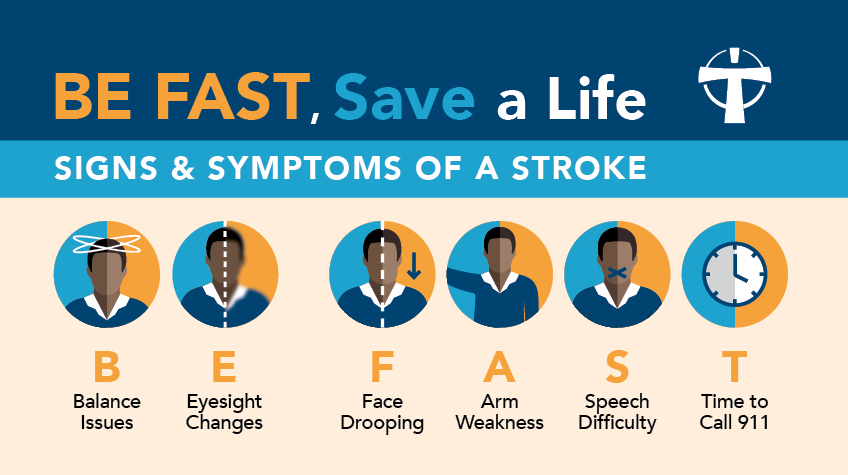
Prevention and education are pivotal to stroke patients’ recovery. Time is critical during a stroke, so we urge everyone to learn the signs of a stroke and B-E F-A-S-T (Balance, Eyesight, Face, Arm, Speech, Time):
- Balance Issues
Is the person having loss of coordination, trouble walking or dizziness?
- Eyesight Changes
Is the person having double vision or any trouble seeing?
- Face Drooping
Does the face look uneven? Ask the person to smile.
- Arm Weakness
Does one arm drift down? Ask the person to raise both arms.
- Speech Difficulty
Does their speech sound strange? Ask the person to repeat a simple phrase.
- Time
If you observe any of these signs, call 911 and get to the emergency room.
Stroke Warning Signs:
- Sudden numbness or weakness of the face, arm or leg, especially on one side of the body
- Sudden confusion, trouble speaking or understanding
- Sudden trouble seeing in one or both eyes
- Sudden trouble walking, dizziness, loss of balance or coordination
- Sudden, severe headache with no known cause
Stroke Risk Factors Include:
- High blood pressure
- High cholesterol
- Heart disease
- Diabetes
- Smoking
- Heavy alcohol use
- Physical inactivity and obesity
- Atrial fibrillation
- Family history of stroke
Reporting
2023 Quality Metrics| Stroke Related Procedure Outcomes
Below is a description of the stroke-related procedures performed at St. Francis Medical Center, with quality information on the complication rates and outcomes of the patient who undergo such procedures.
Thrombolytic Therapy
Thrombolytics, Tenecteplase (TNKase), are a type of medication used for thrombolysis or as a “clot buster” to dissolve the clot blockage within the artery during a stroke. Effectiveness of this medication decreases with time and does have risk for bleeding following the administration. Not all patients are candidates for this treatment as there are certain inclusion/exclusion criteria requirements.
| 2023 |
Volume
|
Complications
|
Mortality
|
|
Q-1
|
17 |
0 |
0 |
|
Q-2
|
13 |
0 |
0 |
|
Q-3
|
13 |
0
|
0
|
|
Q-4
|
6 |
0
|
0
|
|
Total
|
49 |
0 |
0 |
Mechanical Thrombectomy Reperfusion
A thrombectomy is a procedure to remove a clot that is blocking one of the large arteries of the brain during a stroke. This procedure is performed by inserting a catheter with a device attached to remove the clot. This procedure can be done in addition to the administration of a thrombolytic (Tenecteplase) medication or without, however effectiveness of this procedure decreased with time. Not all patients are candidates for this procedure as there are certain inclusion/exclusion criteria requirements.
| 2023 |
Volume
|
Complications
|
Mortality
|
|
Q-1
|
3 |
0 |
0 |
|
Q-2
|
4 |
0 |
0 |
|
Q-3
|
2 |
0
|
0
|
|
Q-4
|
2 |
0
|
0
|
|
Total
|
11 |
0 |
0 |
Diagnostic Cerebral Angiography
Cerebral Angiography is a form of angiography which provides images of blood vessels in and around the brain, thereby allowing detection of abnormalities such as arteriovenous malformations and aneurysms. Typically, a catheter is inserted into a large artery (such as femoral artery) and threaded through the circulatory system to the carotid artery, where a contrast agent is injected. A series of radiographs are taken as the contrast agent spreads through the brain’s arterial system, then a second series as it reaches the venous system. The objective of the exam is to define the site and extent of the arterial abnormality, allowing the physicians to determine the best treatment options.
| 2023 |
Volume
|
Complications
|
Mortality
|
|
Q-1
|
1 |
0 |
0 |
|
Q-2
|
4 |
0 |
0 |
|
Q-3
|
2 |
0
|
0
|
|
Q-4
|
1 |
0
|
0
|
|
Total
|
8 |
0 |
0 |



.png)